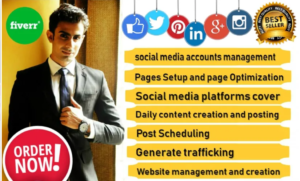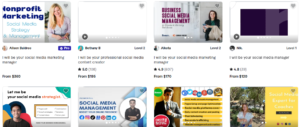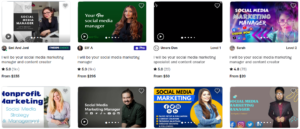15 Ways to Promote Your Business Online
With over 4 billion internet users worldwide, promoting your business online has never been more critical – it’s a necessary step to provide important information to your target audience, increase demand for your products or services, and generate leads and sales for your business.
But here’s the thing: successful online promotion isn’t as simple as sharing a few posts on social media, writing a quick blog post, or sending an email. If you want your online promotion to be successful, you need to cast your net wide and understand the critical components of your marketing strategy, such as the who, what, where, why, and how.
If you’ve ever promoted your business online to generate more traffic and leads but haven’t succeeded, you’re not alone. Up to 66% of companies struggle to meet these goals, leading them to ask: What am I doing wrong?
Fortunately, help is on the horizon. In this guide, you will learn about the most effective ways to market your business online and reap the fantastic benefits that come with it.
Determine the best ways to promote your business to stand out.
1. Develop a strategy for success (SWOT analysis)
2. Define your marketing goals
3. Check how your top competitors are doing
4. Identify your target audience
5. Consult with a marketing strategist
6. Define your marketing budget
7. Define the KPIs for your various channels
8. Start a blog
9. Leverage the power of social media
10. Launch Email marketing campaigns
11. Promote your business through videos
12. Answer questions, give solutions
13. Optimize your website for SEO
14. Grow your traffic with forum marketing
15. Monitor and analyze your KPIs
Let’s dive in one after the other…
1. Develop a strategy for success (SWOT Analysis)
- Before actively marketing your business online, you need to develop a successful online strategy. The best way to do this is to perform a SWOT analysis, a widely used marketing technique that evaluates the four main aspects of your business: strengths, weaknesses, opportunities, and threats.
- “Strengths and weaknesses” refer to your business organization’s assets, processes, people, and anything else internal.
- “Opportunities and threats,” on the other hand, refer to external factors arising from competition, the market, and the economy in general.
To conduct your SWOT analysis, think about and answer the following questions:
- Strength
- What do you do well?
- What special features can you access?
- What do others consider to be your strengths?
- Weaknesses
- What can you improve?
- Where do you have fewer resources than others?
- What do others consider a weakness?
- Opportunities
- What opportunities are available to you?
- What trends can you take advantage of?
- How can you turn your strengths into opportunities?
- Threats
- What threats harm you?
- What is your competition doing?
- What threats do your weaknesses expose you to?
Find help from these experts.
I will optimize the Google My Business profile for local SEO and Google My Business Map ranking.
CHECK ALL
-
Define your Marketing Goals
“Begin with the end in mind?” Have you ever heard the saying? When it comes to promoting your business online, this quote couldn’t be more accurate. The first step to any successful online marketing campaign is knowing your target; In other words, specifically, what you want to achieve through your online marketing efforts.
It will also help you know which KPIs (Key Performance Indicators) you should track to determine whether the outcome is successful.
A good trick is to remember that your goals must be SMART: Specific, Measurable, Achievable, Relevant, and Timely.
To help you define your ‘smart goal,’ answer the following questions:
Specific
- What do I want to achieve?
- Why is this goal important to my business?
- Who is involved?
- Where does it take place?
- What resources are involved?
Measurable
- How much do we want to earn (i.e., value generated through sales, profit, etc.)?
- How many people do we want to reach (i.e., number of subscriptions, sales, website visitors, etc.)?
- How do I know when these numbers are reached?
Can be reached
- How can this goal be achieved?
- Considering possible constraints such as finances, resources, etc., how realistic is this goal?
Related
- Does it fit with our other business efforts and needs?
- Is it a worthwhile project?
- Is it the right time, given the current socio-economic climate?
- Am I (or specific people in the company/external help) the right person to achieve this goal?
Limitation time
- When do we start and end the promotion?
- How long will it take to achieve the desired results?
- What can I do today to work toward this goal? In 6 weeks? In 6 months?
Here are three common online marketing goals that fit your company’s goals:
#1. To provide information. The first step of an online campaign is to inform potential customers about the product or service, where it’s available, how it can benefit them, how much it costs, and why it’s better than other competing products. Buyers like to feel informed when purchasing decisions, so digital marketing is a great strategy.
#2. To increase demand. Demand refers to a customer’s desire to purchase a product or service, especially when they have the power to purchase it at an affordable price.
Promotional strategies to increase demand include discount coupons, contests/giveaways, product samples, celebrity endorsements, and rewards programs, all of which are promoted online. The goal is to create buzz and excitement around the product or service by increasing customer demand.
#3. To generate leads and sales. 85% of B2B marketers say generating leads is the most important goal when promoting a product or service. A lead is someone who shows interest in a company’s products or services, for example, by submitting their personal info in exchange for an email or your giveaway for their subscription, free trial, survey, or download.
Lead generation is an excellent reason for online marketing, mainly because the more leads you have, the more your business has more sales potential.
“Focus on the core problem your business solves and put out lots of content, enthusiasm, and ideas about how to solve that problem.”
Laura Fitton
SEE ALL!!!
-
Check how your top competitors are doing.
Studying your competitors before starting your marketing campaign can give your company a significant advantage.
This helps them identify possible shortcuts to success (i.e., what worked well for them) while minimizing the risk of failure.
Secondly, it enables you to evaluate your company’s strengths and weaknesses compared to the competition.
When analyzing your competitors online, carefully ask yourself the seven following questions:
1. What are your competitors’ Unique Selling Points (USPs)?
2. What types of products or services sell best, and at what prices?
3. What traffic sources (i.e., direct traffic, referring URLs, campaigns, search engines) are used to acquire massive visitors?
4. Do they use paid ads? If so, what platform or social media sites do they advertise on?
5. What search queries are they currently ranking for (or trying to rank for)?
6. How are your marketing funnels structured?
7. How are they trying to capture leads and generate sales?
Check this expert Social Media manager with over 3,000 5-star reviews.
I will do SEO competitor audit reports using ahrefs, semrush, and moz
SEE OTHER EXPERTS- Click Here…
- Identify your target audience.
If you’re unsure who you want to advertise your business to, your marketing efforts won’t be as targeted as expected, leading to frustration and failed promotional campaigns.
Your target audience is a specific group of people most likely to buy your products or services, often sharing many characteristics (age, interests, etc.). The more precise you are about your target audience, the more successful you will be in understanding how and where to reach your best prospects.
“Don’t just create content to get credit for being clever — create content that will be helpful, insightful, or interesting for your target audience.”
To define your target audience, ask yourself the following questions:
- Is my perfect customer male or female?
- What age group do they belong to?
- Where do they live? (i.e., in a specific city, country, or hemisphere? In rural/urban areas?)
- What sector do they work in? What position can they occupy?
- How much do they earn? Are they low, middle, or high-income?
- What level of education do they have?
- What are your hobbies or interests?
- What is most important to them in life? What specific goals might they have?
- What challenges do they face?
- What will influence them to buy the product or service? What objections should they overcome first?
- Where does my target audience spend most of their time online?
- How will my target customer use my product/service? Will they buy it for themselves or gift it to a loved one?
-
Consult with a Marketing Strategist.
Once you have clearly defined your online marketing goals, it becomes much easier to consult a digital marketing expert to determine when, where, and how these goals can be achieved.
A marketing strategist’s role is to define the best inbound marketing strategy for your business, as well as create a final, detailed digital marketing plan that covers the promotion aspects:
- Online channels
- Sales funnel
- Strategies
- KPIs to be measured to determine a successful outcome
A marketing strategist is the best professional when you want to promote your business online as they are very knowledgeable about all types of paid and unpaid inbound marketing strategies. They not only create the most effective online marketing strategy for your business’s specific goals but also do so by considering important factors such as budget and how to achieve the highest ROI in the shortest possible time. Additionally, they can suggest what specific professional help you need to achieve these goals.
Checkout these Marketing specialists

I will provide a profitable digital marketing strategy and plan
Facebook ads
Google AdWords
Marketing plans
Google ads
YouTube marketing
Marketing strategy
Social media marketing
SEO
Industry: Beauty & cosmetics
Marketing & advertising
Strategy purpose: Company/Brand strategy, Growth/Scale
Business stage: Startup, Small business, Medium business
Business type: B2B, B2C, Personal brand, Nonprofit
See More….
I will be your social media marketing specialist and content creator.
-
Define your marketing budget.
Just as every business is different, there is no single number to determine your marketing budget. Because of this, setting a budget can be considered a challenging aspect of online marketing strategy planning, but with the right help and experience, it doesn’t have to be that way.
Remember how we discussed the importance of a marketing strategist in the previous step? When discussing your business goals for online promotion, your marketing strategist will give you a clear idea of how much you can expect to spend on these promotional methods and how you should allocate your budget across different channels.
Research indicates that total marketing budgets typically represent between 8 and 16% of a company’s total revenue, with the average company allocating 45% of its total marketing budget to online promotional methods.
A marketing strategist will consider several factors to help determine the budget needed for online promotion, including:
- Cost of creating necessary content such as blog articles, landing pages or banners for SEM
- Cost to buy specific keywords
- Hidden costs, such as outsourcing work to freelancers or purchasing necessary software or tools
Besides help from a marketing strategist, the other key to controlling your budget is to keep your campaign simple. Online promotion methods like SEM, retargeting, and social media advertising are becoming more complex, with campaigns costing thousands (or in some cases, millions) of dollars. A more affordable form of online promotion, for example, SEO, mainly requires the cost of hiring an SEO specialist.
Again, a marketing strategist will determine which promotional methods are not only the most affordable but will also meet your objectives and provide the best ROI in the shortest possible time.
- Define the KPIs for your various channels.
KPIs (Key Performance Indicators) are used to measure the success of your campaigns. Below, we have listed the most common KPIs that you should track across various inbound channels.
#1. Social Media Advertising
- Number of clicks
- Number of likes
- Number of shares
- Number of comments
- Number of active (and new) followers
#2. Mobile Advertising
- CPA (Cost Per Acquisition)
- RR (Retention Rate)
- Sales revenue
- Return on Ad Spend (ROAS)
#3. PPC/SEM
- CPA (Cost Per Acquisition)
- CTR (click-through rate)
- Exchange rate
- CPC (cost per click)
#4. IF THE
- Number of page views
- Keyword Rankings (Both Ascending or Descending)
- Average session duration
- Number of natural backlinks
- Click-through rate (CTR)
#5. Email marketing (retargeting/remarketing)
- Total clicks
- Click-to-Conversion Rate (CTC)
- Return on Ad Spend (ROAS)
- Total conversions
- Click-through rate (CTR)
#6. Affiliate Marketing
- Number of new affiliates
- Number of new customers
- Average order value
- Average earnings per click
- Click on Traffic
- Start a blog
Ensure you have a well-designed, professional website to target potential customers and a blog full of helpful posts to keep them hooked.
Businesses that blog get 55% more web traffic and 67% more leads than those that don’t. Blogs provide your audience with valuable, share-worthy content and establish your company as an authority in your industry. Blogging can help increase your website’s chances of appearing in Google search results, giving potential customers another way to find your business.
Tip: Don’t disable comments on your blog. By allowing blog comments, you encourage people to interact with your business, which helps you build long-term, trusting relationships.
- Harness the power of social media.
55% of shoppers research social media before making a purchase, so you need to make sure your business is promoted on platforms like Facebook, Twitter, Instagram, Pinterest and more. Find out which platforms your target audience is most active on, then tailor your promotion strategies (with the help of a social media marketing expert) to each of them.
- Start email marketing campaigns.
Email marketing continues to be one of the most effective forms of online promotion, with 91% of buyers wanting to hear from companies that do business through this format. Emails are the most widely used customer relationship management (CRM) form. They enable brands to reach their audiences through targeted email campaigns, regular newsletters, and other promotional methods that drive demand, such as sales and giveaways.
- Promote your business through videos.
When done right, video marketing is considered a very effective online strategy. Videos cover niche topics and have an engaged and passionate audience. Therefore, making a good impression and establishing your company as an authority in these fields can help you attract leads and convert them into customers.

Click Here>> I will create an explainer or commercial video for your business.
-
Answer questions and give solutions.
Sites like Quora and Reddit allow users to answer questions from other community members. The goal here is for users to notice your high-quality, reliable answers and follow external links to your web page, where they can find more useful content about your related products or services.
Another useful Q&A platform is Help a Reporter (HARO), which matches journalists with trusted expert sources in various fields, including small business owners. If you respond to a HARO prompt relevant to your niche and you are cited as a source, you will establish yourself as a leader in your industry and be able to promote your unique products or services.
-
Optimize your website for SEO.
In today’s increasingly digital world, your website acts as your storefront. About half of shoppers visit a company’s website before making a purchase decision, so make sure it has a professional, attractive design and is free of spelling and grammatical errors.
If you want your website to be found, get traffic, and generate leads, every page on your website must be optimized for SEO. Otherwise, search crawlers cannot find, index, and rank your website. Nowadays, SEO is a highly technical online strategy that requires specific knowledge and skills, so a good idea to help you save time and money is to hire a professional SEO expert responsible for finding the main keywords your website must be classified for. And implement them strategically in your pages’ meta tags to achieve search engine relevance.
-
Increase your traffic with forum marketing.
Promoting your business through forums, when done well, can be considered a very effective online strategy. Forums cover niche topics and have an engaged and passionate audience. Therefore, making a good impression and establishing your company as an authority in these fields can help you attract leads and convert them into customers.
Specifically, look for forums with at least 1,000 members and 10,000 posts that get many new posts daily and are full of spam.
- Monitor and analyze your KPIs
The final step is to monitor and analyze the results of your marketing campaign, including tracking KPIs (key performance Indicators) to determine if it was successful. Your KPIs will depend on the type of campaign you’ve launched, as well as the specific goals of your business. Ask yourself:
- Did we achieve our KPIs?
- Did we achieve the specific goal(s) we wanted?
- What is ROI? Is it more, less, or equal to what we expected?
- What did we do well?
- What can we do?
- Overall, would we consider this campaign a success or a failure? why
Summary
While there are many online marketing options for your business, they all have one thing in common: digital marketing is the most effective way to provide information to your target audience, increase demand for your products or services, and generate leads and sales for your business. .
There is no “one size fits all” approach when promoting your business through online campaigns. Your online promotion methods should be tailored specifically for your business, including your goals, target audience, and budget, to meet your KPIs and deliver excellent ROI.
It may seem like a lot goes into online marketing, but luckily, you’re not alone. Multiple marketing experts are available to help you, and with our detailed step-by-step guide to promoting your business online in 2020, you’re already on your way to success.













